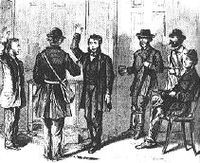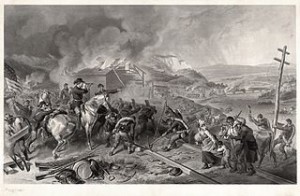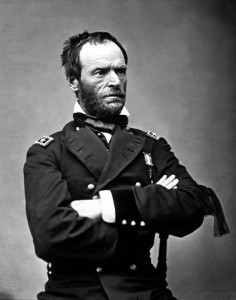The Civil War And Vermont
October 19, 1864
While Vermont’s contribution to the Union during the Civil War is significant, Civil War events in Vermont are not significant. Nevertheless, there is an interesting Vermont Civil War event.
Vermont Was The First State To Abolish Slavery
In 1777, Vermont proclaims itself as an independent state. The second article of the Vermont Constitution abolishes slavery, making Vermont the first state to abolish slavery. In the 1860 presidential election, Abraham Lincoln won a decisive victory in Vermont with voting results as follows:
- Abraham Lincoln – 33,808
- Stephen Douglas – 8,649
- John C. Breckenridge – 1,866
- John Bell – 217
“Vermont Will Do Its Full Duty.”
Vermont had three governors during the Civil War, they were Erastus Fairbanks (1860-1861), Frederick Holbrook (1861-1863), and J. Gregory Smith (1863-1865). All were Republicans.
When the Federal Government called for troops, Governor Fairbanks stated “Vermont will do its Full Duty” and Vermont did so by providing the Union with six infantry regiments, one cavalry regiment, two light artillery batteries, and three sharpshooter companies. Vermont also built three military hospitals.
During the Civil War Vermont Provided The Union:
- Over 28,100 men who served in volunteer units
- 17 infantry regiments
- 1 cavalry regiment
- 3 light artillery batteries
- 1 heavy artillery company
- 3 sharpshooter companies
- 2 frontier cavalry companies
Green Mountain State Casualties In The Civil War
- During battle, 1,832 were killed or mortally wounded
- Disease claimed 3,362 men, either in prison or otherwise
- Over 2,200 Vermont men were taken prisoner
- Vermont men who died while prisoners of war totaled 615
Vermont provided the Union with men who carried with them to Civil War battlefields the reputation and pride of the Revolutionary War Green Mountain Boys. During the Civil War, the youngest to ever to win the Medal of Honor was Vermonter Willie Johnston. Sixty-three other men from Vermont also won the Medal of Honor.
St. Albans Raid
Despite the fury and carnage of the Civil War occurring in other parts of the country, the people of Vermont led a peaceful life during the war years. St. Albans Raid however, muddied the water somewhat for the quiet village of St. Albans. St. Albans is located on the shore of Lake Champlain, only fifteen miles from the Canadian Border.
On October 10, 1864 three young men check in at a hotel in St. Albans. They explain they are from St. John’s Canada (Canada at this time, was the Province of Canada, and part of the British Empire) and are on a sporting vacation. Their leader signs the hotel register as Bennet Young, another signs in as George Sanders. More men from St. John’s regularly arrive at the hotel in groups of two or three every day or so, their sporting vacation in the small St. Albans village is shaping up to be a big affair. Finally, a total of twenty-one young men (they averaged 23 years of age), arrived over nine days. They seemed to be a friendly bunch of young men.
At 3:00 P.M. on October 19, 1864 the Canadian sporting vacation to St. Albans gives way to the real reason and mission for the young men gathering in St. Albans. The friendly young men are actually Confederate cavalrymen who were taken prisoner by Union troops, but had escaped to Canada. They were at St. Albans on authority of the Confederate government to steal money for the Confederate Treasury and to distract Federal troops away from their lines. They were not friendly.
The raiding Confederates divide into three groups and simultaneously enter the three banks of St. Albans. Confederate agent George Sanders has drawn his gun as he climbs the steps of the hotel and shouts: “This city is now in the possession of the Confederate States of America!” The Civil War has come to St. Albans, Vermont with Confederates soldiers taking over the town, galloping about and threatening the Vermont Yankees with guns.The Confederates rob the St. Albans banks of $208,000. While the bank robbing is going on, eight or nine other Confederates gather townspeople to the town common, threatening them with drawn guns and stealing their horses. Confederate Lieutenant Bennett Young orders his men to set St. Albans aflame using bottles of “Greek Fire,” an incendiary chemical that would burst to flame when exposed to air. Fortunately for St. Albans, the bottles of Greek Fire turn out to be duds. Only a woodshed was set afire.
The citizens of St. Albans fight back and one townsman is killed, while another is injured. A lone raider is wounded and he dies afterwards. Confusion and mayhem control the scene for both the townspeople and the Confederate raiders. During their escape to Canada, the Confederates clumsily drop some of the bank money in the town, but still make off with over $200,000. Canadian authorities arrest them in Montreal after the raiders have crossed back into Canada.
The St. Albans Raiders are tried In Montreal. The United States government considers the Confederates to be criminals and requests their extradition. Canada however, has a trick up her sleeve, saying the Confederates are soldiers under military orders. With this stance, and desiring to remain neutral in the American Civil War, Canada does not convict the Confederate raiders of a crime and sets them free. Canada returns to the St. Albans banks $88,000 that was found with the raiders.
It has been interpreted that the ruling of the Canadian court in the St. Albans Raid was in fact recognition of the Confederate States of America by the British, since Canada was then the Province of Canada and part of the British Empire. This is debatable.
The raider Lieutenant Bennett Young, later becomes a Confederate general.



